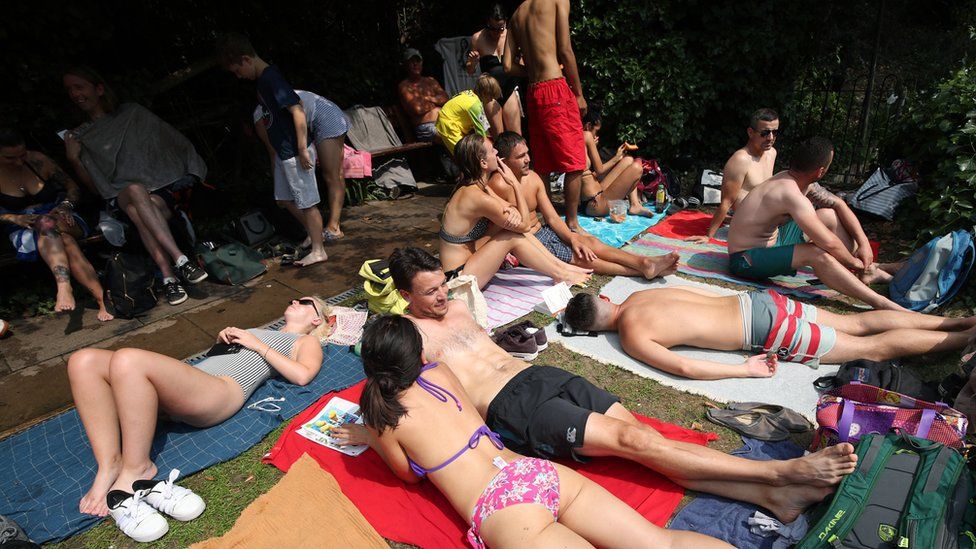Do people think heatwaves are un-British?
- Published

How does Britain, known around the world for its famous grey skies and rain, react to a lengthy heatwave?
"Hallelujah," someone shouted, as a small boy ran into the street and started to dance.
After weeks of hot, dry weather, it had begun to rain and in my London neighbourhood last week, the plump droplets splashing on to the pavement dust were a cause for celebration.
People walked through the storm, getting soaked to the skin, with shiny faces upturned. The country, it seemed, had been holding its breath waiting for this moment, and now it could breathe again. We grumble about our rainy weather, but this summer has reminded us how much we value it.
The strange scenes took me back to 1976, when after weeks of boiling weather and amid warnings of water rationing, the Prime Minister James Callaghan instructed one of his ministers, Denis Howell, to do a rain dance.
When the heavens did indeed open the next day, the nation rejoiced.
Denis Howell, appointed minister for drought in 1976, later served as minister for snow
Euphoria, however, was short-lived. Less than a week later, the minister of state for drought had his title changed to minister of state for floods. Two years later, it changed again - Howell became minister of state for snow.
I don't know whether No 10 had a word with Sam Gyimah, the minister with current responsibility for the Met Office, but in the days before the storm, many had taken to social media to suggest a bit of ministerial rain dancing was required.
The heatwave is, well, it's just not British. Day after day after day of the same blue skies is foreign to us.
Our climate is benign and our weather is changeable. The default is grey, a neutral backdrop against which the excitement of a sunny spell or squally shower is all the greater.
We are famous for our greyness. In AD 94, the Roman historian Tacitus described Britain as a country where "the sky is overcast with continual rain and cloud".
Two thousand years later and the American travel writer Bill Bryson made the same point: "Sometimes it rained, but mostly it was just dull, a land without shadows. It was like living inside Tupperware."
Throughout history, Britain has been noted for its grey skies
The cobwebs and dust of interminable sultriness, daily life which seems ever slower, it all feels alien to the British.
It is often said that our reserved national character is shaped by our temperate climate. But is that true? Are we the product of our weather?
In about 7 AD, the Greek historian and geographer Strabo hinted at an association between his assessments of the British climate (rain and fog) and the British temperament (simple and barbaric).
The suggestion was that the damp, gloomy climate had incubated an uncivilised, backward race.
In 1733, the doctor and writer John Arbuthnot came to the reverse conclusion. He suggested variations in atmospheric pressure found in cold northern climes resulted in "greater activity and courage" compared with people in hot countries who, "free from the agitations and sensations of northern people", were "lazy and indolent".
The Mediterranean is renowned for its sun, scenery and food. But are its people happier than those in gloomier places?
David Hume was unconvinced. The Scots philosopher responded to these ideas in a controversial essay entitled Of National Characters.
In this, he argued that the only observable difference "is the vulgar one, that people in the northern regions have a greater inclination to strong liquors, and those in the southern to love and women".
Even this association was "doubtful", Hume felt.
During the last few decades a significant amount of research has been conducted into the relationship between mood and climate.
Do high temperatures make people passionate? Does precipitation dampen enthusiasm? Are people happier in summer than in winter?
Analysis in the '70s and '80s looking at the performance of students in America and Switzerland (by Howard & Hoffman [1984], Sanders & Brizzolara [1982] and Faust et al. [1974]) variously suggested that high pressure, high temperature and low humidity were associated with positive emotions: basically, nice weather seemed to put people in a good mood.
More recent research suggests the link is close to non-existent, external.
Even the wettest conditions fail to dampen the enjoyment of festival-goers like this couple
Some in Britain instinctively believe that if they lived in a warm, sunny environment instead of enduring waves of Atlantic cloud and rain, everyone would be a lot happier.
The idea that a warm, sunny climate makes us cheerier doesn't hold up.
The happiest region in the UK, according to data from the ONS Wellbeing survey, is the most northerly: Shetland, Orkney and the Outer Hebrides, external.
Some islands here see only around 1,000 hours of sunshine a year compared with a UK average of 1,340 hours.
And international lists of the happiest countries tend to find places like Norway, Sweden, Canada, Denmark and Finland at the top.
There is no correlation between well-being and sunshine - if anything it looks like the opposite.
Finland's people are among the happiest on earth
And yet. And yet. And yet.
Immediately following last week's thunderstorm, when a watery sun sparkled on puddles through clean, fresh air, colours brighter and senses somehow keener, those moments were profoundly exhilarating.
Don't tell me that is not real.
It is not the heat of this summer that is un-British. Already, I have heard familiar moans about the cooler cloudy weather and nostalgia for the summer sizzle.
No, it is the invariability. When we pull back the curtains at the start of a new day, we need to be kept guessing at what we might see. That is the British way.
- Published25 July 2018
- Published31 July 2018